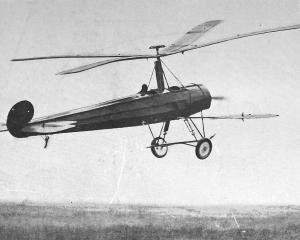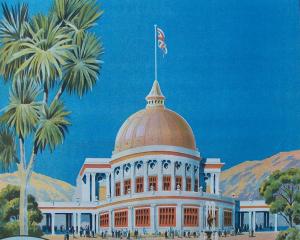When off Cape Race, Newfoundland, the scene of the Titanic disaster, the Karamea ran into a field of ice, and was over 10 hours in getting clear.
Although the speed of the vessel was reduced to two knots an hour, the impact as she bumped her way through the small bergs was sufficient to shake her from stem to stern and dent the bows.
The ice appeared to grow thicker as the vessel proceeded, and in order to avoid serious damage Captain Clifton made a detour of 100 miles southward in his course.
The weather was very cold, the temperature falling to 15 degrees below zero.
On the following day, February 8, the ship's quartermaster (J.W. Scott) died from pneumonia, and was buried at sea.
On the evening of the same day the Karamea steamed into St. John's with the ice and snow 2ft thick over her decks, rigging, and sides.
The spray thrown on to the decks by the big sea running froze as it fell.
Three hours were spent in clearing, with the aid of crowbars and a steam winch, the anchor, which had been frozen to the ship's side. Reports were received at St.
John's of several schooners being sunk by the weight of ice and snow on their decks and rigging, while others were lost through all hands being frostbitten.
During the voyage Captain Clifton suffered from a severe attack of rheumatic fever, and a call had to be made at Capetown for medical assistance.
The White Star cattle-steamer Naronic, with a crew of 60 hands and 17 cattlemen, was lost while on a voyage from Liverpool to New York.
A boat with the name Naronic on it was subsequently found half full of water and abandoned.
The vessel was a new one, launched in May of the previous year, and she was built with bulkheads and all modern improvements.
If these vessels had had wireless, many lives might have been saved, and at least intelligence would have been received of the manner in which they met their end.
• A strong protest against the reduction of teachers' salaries, through the falling-off in attendance, due to causes beyond the control of the teachers affected, was made at the annual meeting of the Te Aro district householders (says the Wellington Post).
Mr W.J. Lankshear thought it was most unfair that Mr Watson, the head master at Te Aro, should have his salary reduced year after year because fewer children were attending the school.
Many parents had left the district to live in the suburbs, where rents were cheaper. Mr Watson was not to blame because fewer parents were living in the district.
Yet his salary was reduced on that account. Dr Wallace Mackenzie asserted that the education system was being starved.
The teachers should be better paid and women teachers should reserve as much salary as men in the profession.
Mr T. C. Farland suggested that the city committees should combine and wait upon the Minister of Education to urge that teachers should not have their salaries reduced because, through no fault of their own, the number of scholars dwindled.
The meeting agreed with the views of the speakers.
• The small city of Odder, Norway, a place of some 400 inhabitants, still refuses to allow the motor-car to use its roads.
Motorists passing through the town have to procure a horse to draw their cars through the streets, and those guilty of contravention of this regulation are heavily fined.
- ODT, 27.4.1912.











